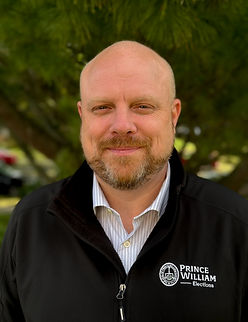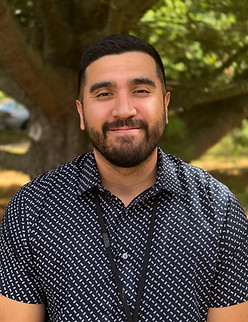
Office Leadership
PWC Electoral Board

Heidi Stirrup (Chair) was appointed as a member of the Electoral Board of Prince William County, Virginia in January 2025. Mrs. Stirrup brings extensive knowledge of the political process and campaign experience to her work. Most importantly, she is committed to ensuring that the citizens of Prince William County can trust that our elections are conducted in such a way that the outcomes accurately reflect the will of the voters. Mrs. Stirrup will work to ensure there is maximum transparency to further public confidence in the election process. Prior to this appointment, Mrs. Stirrup served as the White House Liaison for the U.S. Department of Justice, responsible for political appointments and personnel actions related to the political appointees. Mrs. Stirrup served as the Deputy White House Liaison for the U.S. Department of Health and Human Services, and later as the Deputy Assistant Secretary for Policy in the Administration for Children and Families. Email
Term: January 2025 - December 2027

Yolanda D. Montgomery (Vice-Chair) is the Executive Director and Counsel of the IAM National Benefit Funds, where she oversees the administrative and operational functions of the National Pension Fund, the Benefit Trust Fund, and the National 401(k) Fund.
Prior to joining the IAM National Benefit Funds, she served as Assistant Executive Director and Counsel of the SEIU Benefit Funds, where she similarly oversaw administrative and operational functions. Earlier in her career, Ms. Montgomery was an attorney at Proskauer Rose in New Orleans, where her practice focused on ERISA substantive plan work, ERISA litigation, and labor and employment law. While at Proskauer, she was actively involved in Election Protection efforts and volunteered with the NAACP and the Lawyers’ Committee for Civil Rights Under Law. She has also participated in election phone-banking efforts in Louisiana and Texas.
Ms. Montgomery was appointed to serve as a member of the Prince William County Electoral Board in January 2026. In this role, Ms. Montgomery is committed to safeguarding the integrity, transparency, and fairness of local elections. Drawing on her extensive experience in governance, compliance, and fiduciary oversight, Ms. Montgomery understands the importance of adhering to the law, following established processes, and maintaining public confidence in essential civic systems. Ms. Montgomery is dedicated to administering elections ethically and responsibly and to serving the voters of Prince William County with professionalism, accountability, and respect for the democratic process. Email
Term: January 2026 - December 2028

Keith Scarborough (Secretary) has served as a member of the Electoral Board since 2007. During that time, he has helped oversee more than 40 elections, including five presidential elections. Keith has a strong commitment to ensuring fair, open and accurate elections and to protecting the voting rights of all citizens. In 2015, he worked with the Prince William County Human Rights Commission, the local chapter of the NAACP and several other groups to host a successful event at Little Union Baptist Church in Dumfries to celebrate the 50th anniversary of the Voting Rights Act of 1965. A self-described “political junkie,” Keith has been actively involved in politics at the local, state and national level for more than five decades. He has attended two national political conventions as a delegate and was elected as a Presidential Elector in 2016. Growing up in Nebraska, Keith received his undergraduate and law degrees from the University of Nebraska. After practicing law for several years, he worked as a Legislative Counsel in the Nebraska Legislature and the United States Senate. After leaving the Hill, Keith worked for over thirty years as a lawyer/lobbyist for two DC-based trade associations, retiring in 2019. Email
Term: January 2024 - December 2026
Office of Elections

Eric Olsen (Director of Elections) was hired as the Director of Elections for Prince William County in late 2021. He has been serving in critical roles in election administration in Virginia, Maryland, and Washington DC since 2010. Mr. Olsen has received national awards for his leadership in elections including a Knight Foundation grant in 2015 for innovations in reducing election lines (the only government recipient out of 1,000+ applicants) and an EAC Clearinghouse House Award in 2025 for pioneering government transparency efforts. During his tenure, the PWC Office of Elections has spearheaded Virginia’s largest “I Voted” sticker contest, built a model officer manual, eliminated a huge party disparity in election officers, created a unique Open House program, made equipment and facility upgrades to maximize election security, and expanded voter education and transparency tools to make the PWC Office of Elections a leader in Virginia elections. All this was accomplished while saving county taxpayers more than half a million dollars over the first three fiscal years. From 2021 to 2024, Prince William residents rated their satisfaction with the voting experience as the most improved interaction among dozens of county programs. Mr. Olsen graduated from St. Mary’s College of Maryland with a BA in Political Science/Sociology, has a law degree from Case Western Reserve University, and is a licensed attorney. Email

Jonathan Alvarez (Deputy Director, Election Operations) began working for the Prince William County Office of Elections in 2015 and is a long-time resident of the Prince William County–Manassas City area. Over the past decade, he has supported multiple election cycles, including three presidential elections, and takes pride in helping ensure each one runs smoothly and fairly. His areas of responsibility include overseeing election operations and election officer coordination. Before his work in elections, he served four years in the United States Navy, completing one shipboard deployment to the 5th and 6th Fleet areas of responsibility. The values of teamwork, discipline, and service learned during his military career continue to guide his work today. He takes great pride in serving the community he grew up in and finds fulfillment in helping maintain the integrity of local elections for all residents of Prince William County. Email

Natalia Taylor (Deputy Director, Voter Services) brings almost a decade of experience in election administration, process innovation, and public service. She earned her Master’s Degree in Business and Administration—graduating with honors at the top of her class—from one of Russia’s leading universities. With a strong background in customer service and organizational leadership, She is deeply committed to ensuring fair, efficient, and voter-focused election operations. In her leadership role, Natalia oversees key areas of voter registration, vote-by-mail operations, and candidate filings. Since joining the Office of Elections, she has spearheaded major modernization initiatives, including the redesign of ballot envelopes, the automation of mailed ballot data submission to vendors, and the development of efficient workflows for processing returned ballots. She has also enhanced the provisional ballot adjudication and cure processes, improving quality control, accuracy, and transparency. She has built and implemented several custom databases to streamline operations, reduce manual workload, and strengthen the overall integrity of election administration. Her leadership reflects a strong dedication to innovation, accountability, and public trust. Natalia takes great pride in serving the citizens of Prince William County and considers it a privilege to contribute to the administration of fair, accessible, and secure elections. Email
MORE INFORMATION
The Constitution and Code of Virginia define the structure and function of Virginia's electoral system and the qualifications for voting and holding elective office.
The Code of Virginia, Title 24.2, Chapter 1, Article 3, provides that the majority of the Judges of the Circuit Court appoint the three members of the Electoral Board, who serve staggered three-year terms. Two members must be of the political party of the Governor and one of the other major party. Article II, Section 8, of the Constitution provides that the Electoral Board appoint the Officers of Election and the General Registrar.
The Constitution and the Code of Virginia specify the duties of the Electoral Board. The Board must hold public meetings during the first week of February and March. It must also supervise registrations and elections; certify elections; appoint the officers of election and the registrar; prepare a budget and submit it to the County; manage the records of the Board; train officers of election; certify candidates for elective office; and recommend election districts and polling places to County Council.
The Code of Virginia, Title 24.2, Chapter 1, Article 4, describes the duties of the Registrar. The Registrar manages the voter registration system; conducts a public information program; assists the Electoral Board in formulating and implementing policy; identifies externalities that will affect voter registration and elections; provides information and analysis needed to plan ahead; and coordinates programs with the State Board of Elections, County officials, Voter Registrars' Association of Virginia and other registration and election groups. The General Registrar's term is four years.
Electoral Board members receive part-time remuneration, paid by the County and reimbursed by the Commonwealth. The Registrar receives a full time salary, paid by the County and partially reimbursed by the Commonwealth. The Office of Elections' staff is supervised by the General Registrar and paid by the county.

